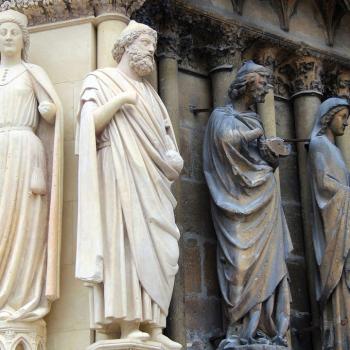Tribulation Force, pp. 74-79
Like Bruce Barnes, the other members of the Tribulation Force seem to view this early stage of the End of the World as a kind of down time.
They might be getting a head start preparing for the next 6 years and 49 weeks of tumult ahead, but I guess they figure, according to the Tim LaHaye Timeline, that nothing really kicks in until after the Antichrist breaks his peace treaty with Israel, and since he won't even announce that treaty until later this week, they're taking advantage of the apocalyptic lull to chill out, relax and waste the readers' time.
Buck takes this opportunity to try to talk to Chloe. This is a conversation he's been building up and rehashing in his mind, turning it into the kind of conversation that follows someone's saying, "We need to talk." Those conversations never go well:
As the service ended, Buck took Chloe's arm, but she seemed less responsive than he might have hoped. She turned slowly to see what he wanted, and her expression bore no sign of that expectant look she'd had Friday night. Clearly, he had somehow wounded her.
No "expectant look," no heaving bosom, no leaning forward and giggling at his jokes. This isn't going the way Buck planned, so immediately he shrivels into defensive martyr mode.
"I'm sure you're wondering what I was calling about," he began.
"I figured you'd tell me eventually."
"I just wondered if you wanted to see my new place." He told her where it was. "Maybe you could drop over late tomorrow morning and see it, and then we could get some lunch."
I hear Lili Taylor's voice from Say Anthing, "That's not a date, Buck, that's a scam." And it's not even a well-executed scam. He's attempting the time-honored weasel move of asking her out in a way that she can't be sure if he's actually asking her out on an actual date. That way she might agree to this even if she wouldn't have agreed to that. Also, if she tells him no, he won't be sure what, exactly, she was saying no to, and this unspecific rejection might be less painful. But this passive aggressive approach doesn't usually involve requiring the woman to drive to your apartment.
"I don't know," Chloe said. "I don't think I can do lunch, but if I'm over that way maybe I'll stop by."
"OK." Buck was deflated. …
There's plenty more of this Buck/Chloe business throughout Tribulation Force, and all of it is just as cringe-inducing. We could dwell on the ineptitude of Jerry Jenkins' portrayal of his characters' ineptitude, or we could peek under the rock of Buck's notion of himself as a suffering Nice Guy, but here instead I think I'll just cut Jenkins a bit of slack.
Whatever his problems with the execution of this scene, Jenkins' intent here, I think, was to convey a bit of his fondness for his characters while poking fun at their foibles and the foolish way we all sometimes behave when we are smitten. And for once Jenkins allows himself to do that without incorporating a didactic reminder of the proper forms of RTC courtship and of the paramount duty not to have or act upon dirty, dirty, dirty thoughts about kissing and such. Maybe that's because this scene, unlike the unchaperoned airport cookie incident, takes place in the sanctuary of a church, with the young lovers separated by the high back of a church pew and the woman's father standing nearby.
So despite the unpleasantness of being subjected to another round of immature, defensive flirtation, it is nice to see Jenkins express a measure of fondness for his characters without immediately smothering it in self-righteous triumphalism. And it's unexpectedly refreshing to see the authors, for once, acknowledge that our fallibility and finitude as humans often leads us to behave foolishly without them rushing to conclude that this foolishness demands to be punished with wrath, Tribulation and an eternity of pain. However briefly or ineptly, Jenkins here expresses a bemused mercy for humans behaving humanly. It's only the tiniest shard of empathy and generosity, but in a series of books so devoid of those qualities, it stands out.
Chloe makes her escape and it's Rayford's turn to corner someone in an awkward conversation:
A question gnawed at Rayford. He looked at the ceiling and then back at Buck. … "Buck, let me ask you something. Do you ever regret introducing Hattie Durham to Carpathia?"
They spend the next two pages rehashing their feelings of guilt for their respective roles in getting Hattie involved with the Antichrist and discussing, again, how Buck might get a chance to talk to her when he visits New York. This conversation is marked by the same condescension they both showed Hattie before their respective conversions. And by the same hostility. If anything, that hostility — due to her being an attractive woman who inexplicably failed to jump into bed with either of them — seems even sharper here, despite their expressions of spiritual concern.
Buck admits that he regrets not hitting that having introduced Hattie to Nicolae.
"I wondered," Rayford said. "I have a lot of regrets about her. We were friends, you know. Coworkers, but friends, too."
"I gathered," Buck said.
"We never had a relationship or anything like that," Rayford assured him. "But I find myself caring about what happens to her."
"I hear she's taken a 30-day leave of absence from Pan-Con."
"Yeah," Rayford said, "but that's just window dressing. You know Carpathia's going to want to keep her around, and he'll find the money to pay her more than she's making with us."
Decent pay for women is, apparently, another aspect of the Antichrist's nefarious peacemaking scheme.
"She's got to be enamored of the job, not to mention him. And who knows where that relationship might go?"
"Like Bruce says, I don't think he hired her for her brain," Buck said.
Rayford nodded. So they agreed.
By this point the real question gnawing at Rayford is pretty clear. He can't stand the thought that Hattie has abandoned the established rules of their long pseudo-affair. She was, as the first sentence of the first book said, the woman he never touched. But no one else was ever supposed to touch her either.
He's standing in the sanctuary of a church immediately following the Sunday service, so Rayford can't state what he's really asking as bluntly as he'd like, but the subtext of this whole conversation is his cornering Buck to say, "Do you think she's sleeping with him? Omigod, I bet she is. She can't be — what do you think? She is, isn't she? With him and not with …"
"I worry about her," Rayford continued, "and yet because of our friendship I don't feel I'm in a position to warn her. She was one of the first people I tried to tell about Christ. She was not receptive. Before that I had implied more of an interest in her than I had a right to have, and naturally she's not real positive about me just now."
Buck leaned forward. "Maybe I'll get a chance to talk to Hattie sometime soon."
"But what will you say?" Rayford asked. "For all we know they may already be intimate. She'll tell him everything she knows. If she tells him you've become a believer and that you're trying to rescue her, he'll know he had no impact on your mind when he was brainwashing everyone else."
That's a legitimate concern. If Hattie learns of the Tribulation Force's secrets, she might reveal their plans to Nicolae (that is, you know, if they had any plans). But what really seems to be bugging Rayford is that Hattie and Nicolae might be at that very moment lying in bed at the Plaza Hotel, chuckling over her stories about the awkward middle-aged pilot who could never satisfy her the way he did.
"I wonder if she's already moved to New York," Rayford said, "Maybe we'll find a reason for Chloe to call her apartment in Des Plaines."
Because it's not stalking if you get your daughter to do it for you.
Buck escapes and Rayford stands there:
… wondering how much he should encourage the relationship between Chloe and Buck. … The idea that his daughter might date or even fall in love with a man on speaking terms with the Antichrist … it was too much to fathom. He would have to be frank with them both about it, if it appeared the relationship was going anywhere.
Driving home from church, Chloe tries to make sense of the strange conversation she'd just had with Buck. "He's treating me like a sister, and yet he wants me to drop in and see his place tomorrow," she says, obsessing over the details in a way that might have seemed charming if it weren't Buck she were dwelling on and if we hadn't already read three or four variations of this exact scene in the previous chapters.
"I'm mad at myself," she continues. "I come away from a message like that one, and all I can think about is a guy I've somehow let slip away. It's not important. … Old things are passed away and all things have become new. … Worrying about guys should definitely be an old thing."
The bit there that sounds like she's quoting scripture is, in fact, a quote from scripture. It's 2 Corinthians 5:17, "So if anyone is in Christ, there is a new creation: everything old has passed away; see, everything has become new!"
That gloriously hopeful passage is often cited as a description of what it means to be "born again," which is what Chloe seems to mean by it here. But it's still a very strange verse to encounter in this book, which delights in the destructive passing away of so many things, but has little interest in new creation.
It seems impossible to square the verb tenses St. Paul uses in this verse with the future cataclysm portrayed in the Left Behind series. "There's a New World Coming" was the title of a popular precursor to these books written by Hal Lindsay, but that's not what Paul says. He says "there is a new creation." Is, not will be. The not yet is already present in the now.
This verse seems even more out of place here in Tribulation Force if we look at the larger context of the passage. Paul is presenting an extended argument about reconciliation:
… see, everything has become new! All this is from God, who reconciled us to himself through Christ, and has given us the ministry of reconciliation; that is, in Christ, God was reconciling the world to himself, not counting their trespasses against them, and entrusting the message of reconciliation to us.
The God whom Paul describes cannot be reconciled with the god of Left Behind. The god of these books is a destroyer, not a reconciler. This god counts our trespasses against us and makes us pay for them. In these books, the "ministry of reconciliation" Paul speaks of is, itself, one of the old things that must pass away. Paul's gospel of reconciliation is itself irreconcilable with the death-dealing, Robo-Jesus who will arrive later in these books.
"Reconciliation," after all, is almost a synonym for "peacemaking" and we all know what that means.
As Chloe's spiel about Buck runs out of steam, Rayford chimes in with his idea of fatherly advice. "Suit yourself," he says.
"That's just what I don't want to do," she replies. "If I suited myself I'd see Buck this afternoon and find out where we stand."
So there you have it. The painful immaturity of Buck and Chloe's passive-aggressive miscommunication is actually a function of their newfound faith. This faith somehow forbids or prevents them from honestly expressing or demonstrating their mutual affection. Not only does this faith not include God reconciling all things, but it apparently keeps us from getting together with one another as well.
Buck heads home after church to sulk over Chinese takeout. He obsesses about the Chloe situation for another page or so, but tries to take his mind off of it by thinking about work.
His story was ready to be transmitted to New York, and he would be eager for a reaction from Stanton Bailey. He also looked forward to getting his office machines and files, which should arrive at the Chicago bureau office in the morning. It would be good to pick those up and get organized.
One of the odder things about both Buck and Rayford throughout this book is that they both seem intent on keeping their jobs, right up until Armageddon if possible. Both of them likely have enough savings that they could easily retire at this point — the money only needs to last for seven years max, and odds are for less than that — but neither even seems to imagine the possibility.
It's like the joke where the guy says to his buddy, "If you knew that you only had one week to live, just the next seven days, what would you do?" And his buddy says, "I'd kick myself for having used up all my vacation time."
Here it is, the End of the World, and Buck Williams is looking forward to getting his files organized.
















